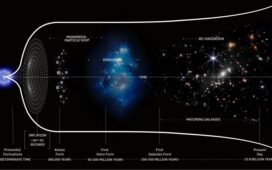The whole isn’t greater than the sum of its parts; that’s a flaw in our thinking. Non-reductionism requires magic, not merely science.
There’s a statement that one can make that would have been completely non-controversial at the end of the 19th century, but that many people both in and out of science would argue against today. Have a listen to it and experience for yourself how you feel about it:
“The fundamental laws that govern the smallest constituents of matter and energy, when applied to the Universe over long enough cosmic timescales, can explain everything that will ever emerge.”
This means that the formation of literally everything in our Universe, from atomic nuclei to atoms to simple molecules to complex molecules to life to intelligence to consciousness and beyond, can all be understood as something that emerges directly from the fundamental laws underpinning reality, with no additional laws, forces, or interactions required.
This simple idea — that all phenomena in the Universe are fundamentally physical phenomena — is known as reductionism. In many places, including right here on Big Think, reductionism is treated as though it’s not the taken-for-granted…















